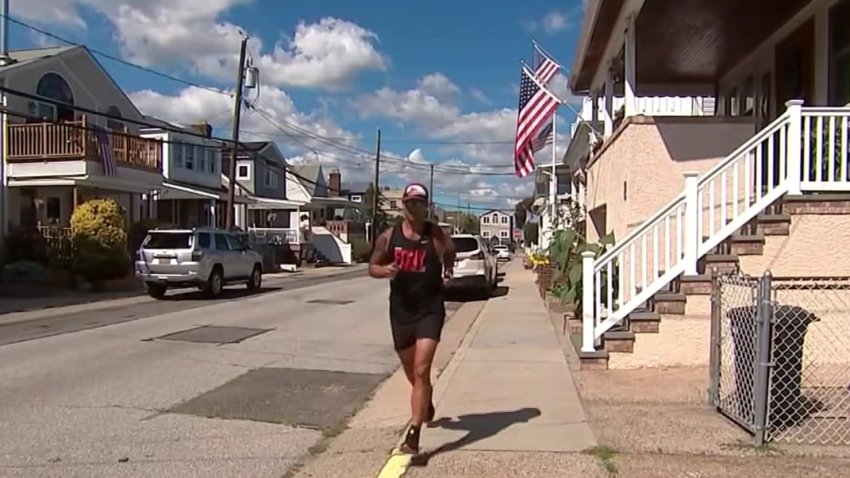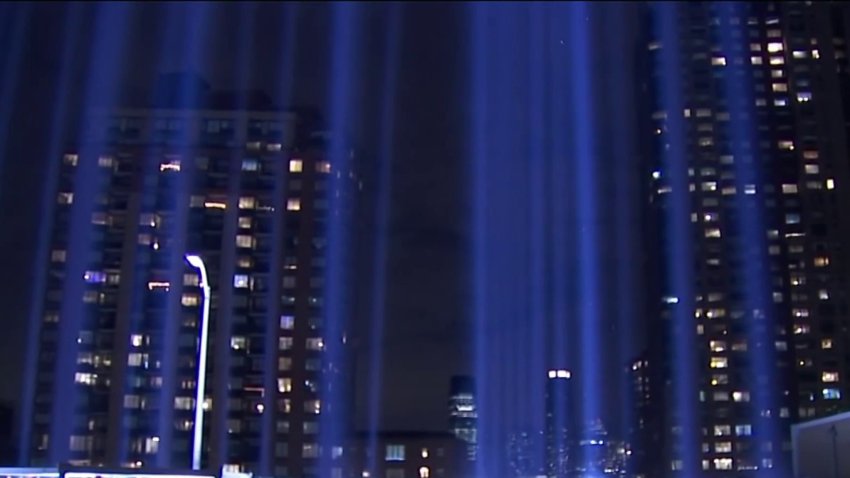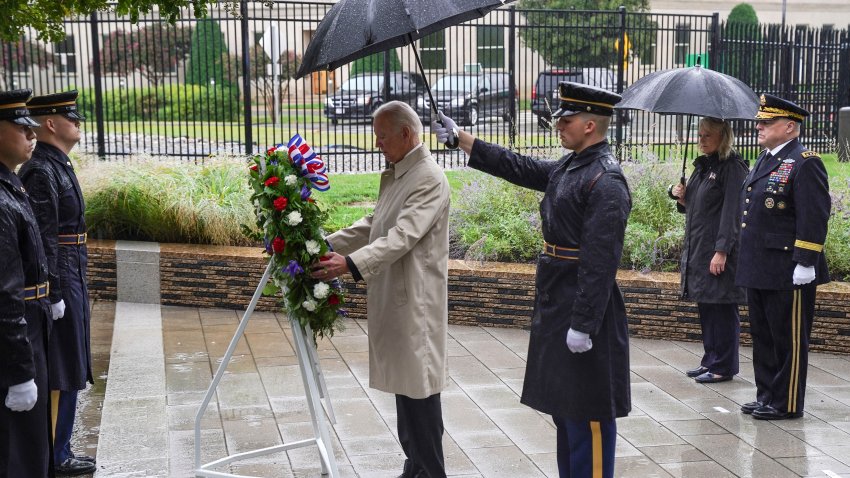More than two decades later, Sept. 11 remains a point for reflection on the attack that reconfigured national security policy and spurred a U.S. “war on terror” worldwide. News 4’s Andrew Siff reports.
Americans remembered 9/11 on Sunday with tear-choked tributes, and pleas to “never forget," 21 years after the deadliest terror attack on U.S. soil.
Bonita Mentis set out to read victims' names at the ground zero ceremony wearing a necklace with a photo of her slain sister, Shevonne Mentis, a 25-year-old Guyanese immigrant who worked for a financial firm.
Stream NBC4 newscasts for free right here, right now.
“It’s been 21 years, but it’s not 21 years for us. It seems like just yesterday," Mentis said before reading victims' names at the World Trade Center to a crowd that included Vice President Kamala Harris and husband Doug Emhoff.
“No matter how many years have passed, nobody can actually comprehend that what happened that very day,” she added.
We have the news you need to know to start your day. Sign up for the First & 4Most morning newsletter — delivered to your inbox daily.
By tradition, no political figures speak at the ground zero ceremony. The observance centers, instead, on relatives reading aloud the names of the dead. Victims’ relatives and dignitaries also convened at the other two attack sites, the Pentagon and a field in Pennsylvania.
More than two decades later, Sept. 11 remains a point for reflection on the hijacked-plane attacks that killed nearly 3,000 people, reconfigured national security policy and spurred a U.S. “war on terror” worldwide. Sunday's observances, which follow a fraught milestone anniversary last year, come little more than a month after a U.S. drone strike killed a key al-Qaida figure who helped plot the 9/11 attacks, Ayman al-Zawahri.
Pierre Roldan, who lost his cousin Carlos Lillo, a paramedic, said “we had some form of justice” when a U.S. raid killed Osama bin Laden in 2011.
“Now that Al-Zawahri is gone, at least we’re continuing to get that justice,” Roldan said.
The Sept. 11 attacks also stirred — for a time — a sense of national pride and unity for many, while subjecting Muslim Americans to years of suspicion and bigotry and engendering debate over the balance between safety and civil liberties. In ways both subtle and plain, the aftermath of 9/11 ripples through American politics and public life to this day.

But like some other victims' relatives, Jay Saloman fears that Americans' consciousness of 9/11 is receding.
“It was a terrorist attack against our country that day. And theoretically, everybody should remember it and, you know, take precautions and watch out," said Saloman, who lost his brother, Wayne Saloman.
Like a growing number of those who read names at ground zero, firefighter Jimmy Riches’ namesake nephew wasn’t born yet when his relative died. But the boy took the podium to honor him.
“You’re always in my heart. And I know you are watching over me,” he said after reading a portion of the victims’ names.
Nikita Shah wore a T-shirt that bore the de facto epigraph of the annual commemoration — “never forget” — and the name of her father, Jayesh Shah. She was 10 when he was killed.
The family later moved to Houston but often returns to New York for the anniversary to be "around people who kind of experienced the same type of grief and the same feelings after 9/11,” said Shah.

Readers often add personal remarks that form an alloy of American sentiments about Sept. 11 — grief, anger, toughness, appreciation for first responders and the military, appeals to patriotism, hopes for peace, occasional political barbs, and a poignant accounting of the graduations, weddings, births and daily lives that victims have missed. A few readers noted recent events this year ranging from the still ongoing coronavirus pandemic to Russia's war in Ukraine.
Some relatives also lament that a nation which came together — to some extent — after the attacks has since splintered apart. Federal law enforcement and intelligence agencies, which were reshaped to focus on international terrorism after 9/11, now see the threat of domestic violent extremism as equally urgent.
More than 70 of Sekou Siby's co-workers perished at Windows on the World, the restaurant atop the trade center's north tower. Siby had been scheduled to work that morning until another cook asked him to switch shifts.
The Ivorian immigrant wrestled with how to comprehend such horror in a country where he'd come looking for a better life. And he found it difficult to form friendships as close as those he'd had at Windows on the World. It was too painful, he'd learned, to become attached to people when “you have no control over what’s going to happen to them next.”
“Every 9/11 is a reminder of what I lost that I can never recover,” Siby said in the leadup to the anniversary. He's now president and CEO of ROC United, a restaurant workers' advocacy group that evolved from a post-9/11 relief center.

Speaking at the Pentagon on Sunday, President Joe Biden recalled seeing smoke rise from the stricken U.S. military headquarters on 9/11, when he was a senator. He vowed that the U.S. would continue working to root out terrorist plots and called on Americans to stand up for democracy on days beyond the anniversary.
“We have an obligation, a duty, a responsibility to defend, preserve and protect our democracy — the very democracy that guarantees the right to freedom that those terrorists on 9/11 sought to bury in the burning fire, smoke and ash,” the Democrat said.
First lady Jill Biden was scheduled to speak in Shanksville, Pennsylvania, where one of the hijacked planes went down after passengers and crew members tried to storm the cockpit as the hijackers headed for Washington. Al-Qaida conspirators had seized control of the jets to use them as passenger-filled missiles.
Beyond the attack sites, other communities around the country marked the day with candlelight vigils, interfaith services and other commemorations. Some Americans joined in volunteer projects on a day that is federally recognized as both Patriot Day and a National Day of Service and Remembrance.

